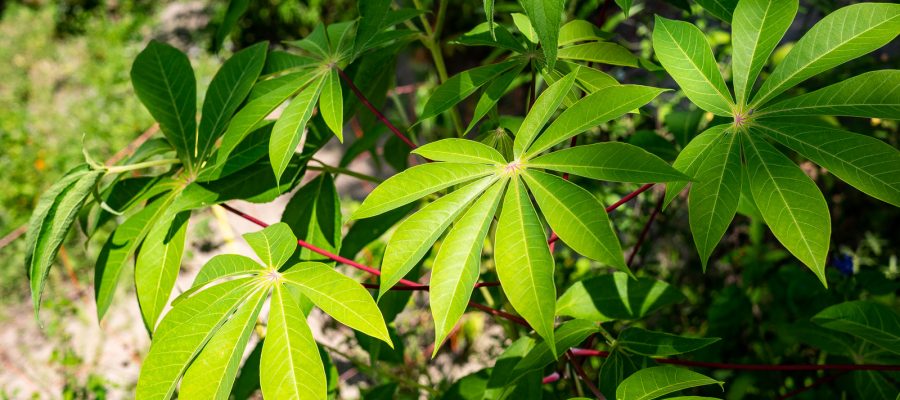Scientific Name: Manihot esculenta
Bahasa Indonesian: Singkong
Batak: Attirha
Basic Information:
Cassava, also called manioc,yuca, macaxeira, mandioca and aipim is a woody shrub native to South America of the spurge family, Euphorbiaceae. Although a perennial plant, cassava is extensively cultivated as an annual crop in tropical and subtropical regions for its edible starchy tuberous root, a major source of carbohydrates. Cassava is predominantly consumed in boiled form, but substantial quantities are used to extract cassava starch, called tapioca, which is used for food, animal feed and industrial purposes. The Brazilian farinha, and the related garri of Western Africa, is an edible coarse flour obtained by grating cassava roots, pressing moisture off the obtained grated pulp, and finally drying it (and roasting in the case of farinha).
Cassava is the third-largest source of food carbohydrates in the tropics, after rice and maize. Cassava is a major staple food in the developing world, providing a basic diet for over half a billion people. It is one of the most drought-tolerant crops, capable of growing on marginal soils. Nigeria is the world’s largest producer of cassava, while Thailand is the largest exporter of cassava starch.
Cassava is classified as either sweet or bitter. Like other roots and tubers, both bitter and sweet varieties of cassava contain antinutritional factors and toxins, with the bitter varieties containing much larger amounts.It must be properly prepared before consumption, as improper preparation of cassava can leave enough residual cyanide to cause acute cyanide intoxication, goiters, and even ataxia, partial paralysis, or death.
Health Benefits:
- Cassava contains fibers, which are not soluble in water. It helps in the absorption of toxins that enter your intestines. In that way, it improves your digestive health and keeps it chugging along nicely
- Most of us suffer from headaches, and for some, it can become unbearable. But you can treat it with the help of cassava! All you have to do for this is take 60 grams of cassava roots or leaves and soak it in water for a couple of hours. Make fresh juice using a blender and then drink it down twice a day. And banish those killer headaches
- Cassava is rich in Vitamin A and compounds such as bakarotennya that improve the health of your eyes and in the future prevents blindness or poor eyesight
- Rheumatic diseases refer to diseases pertaining to the muscles and joints. Osteoporosis, arthritis, spondylitis and lupus are some examples. Cassava leaves are rich in magnesium. In fact, a diet high in magnesium leads to lowered blood pressure levels that reduces the chances of rheumatic diseases throughout life
- Cassava leaves are great for healing injuries and wounds. It has plenty of nutrients that can help in quickly healing such injuries. Crush cassava leaves in a little amount of Aloe Vera gel and make a smooth paste. Smear this paste on the wound. You can also use the stem of cassava in healing wounds
Fun Facts:
- Nigeria is the world’s largest producer of Cassava having 21% of the world total
- Cassava should never be eaten raw — it contain traces of cyanide that can be deadly! The Bill and Melinda Gates Foundation is helping to breed cassavas with less cyanide.It contains harmful toxins, concentrated in the outer skin. Peel it thoroughly, removing all of the brown skin and cook it appropriately
- The pearls in bubble tea are made from moistened tapioca (cassava) flour by forcing it through a sieve
- Fermented cassava, known as ‘tape’, is popular in Indonesia and is used to make sweets and desserts
- People with dietary constraints will appreciate that cassava is gluten-free, grain-free and nut-free
- Bill and Melinda Gates are investing in the creation of a type of cassava with enhanced nutritional qualities to help developing countries
Sources:
https://en.wikipedia.org/wiki/Cassava
https://www.stylecraze.com/articles/benefits-of-cassava-on-your-skin-hair-and-health/#gref
http://sortedfood.com/blog/15-things-you-didnt-know-about-cassava/
https://casadecampoliving.com/10-things-you-didnt-know-about-cassava/

